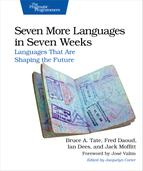Introduction
In a warm room in 2012 London, I was nervous. I’d given this same talk to crowded rooms around the world. Sure, I was confident that the crowd would laugh at my usual jokes, and even applaud almost on demand, but this time, there was a catch. Four creators of the seven languages in my book were in the audience right in front of me. I was worried about having enough credibility to talk about these beautiful creations in this setting. In the end, I may have stumbled a time or two, but the talk went fine. Joe Armstrong, the creator of Erlang and a dear friend now, even complimented me on the talk, and he invited me to come keynote the Erlang Users Community in Stockholm six months later.
The most poignant moment for me, though, was a listener’s question. She asked, “Can you really learn seven languages in seven weeks?” We both knew the answer. As with spoken languages, it takes months or even years of immersion to really learn a programming language. So why should we even try?
Each new language exposes you to a vocabulary, but not one of words. This new vocabulary is composed of the ideas that you use to shape your world. Though the precise syntax will almost certainly not commute from your sandbox into your production solutions, you’ll see that many of the idioms do. When you work through Elixir macros, you’ll learn to express your code in templates, and this metaprogramming can radically improve any programmer. When you work through Factor, you’ll learn to naturally compose functions in powerful and interesting ways that might not have seemed natural before. And after a few weeks with miniKanren, expressing programs as individual steps may no longer seem as effective as expressing a few simple rules.
Think of a painter who has learned to express depth after trying a hand at sculpture, or a young business executive who learns new spreadsheet techniques after taking a new math or programming class. Ideas are the currency of our trade. Each idiom that you master increases your worth.
Each Seven in Seven book tries to tell a story, making informed choices that will teach you the idioms we think you most need to know. Our job as authors is to find the right set of languages that expose you to the most important idioms you’re likely to see. To do that, we need to have a strong understanding of where our industry is heading.
